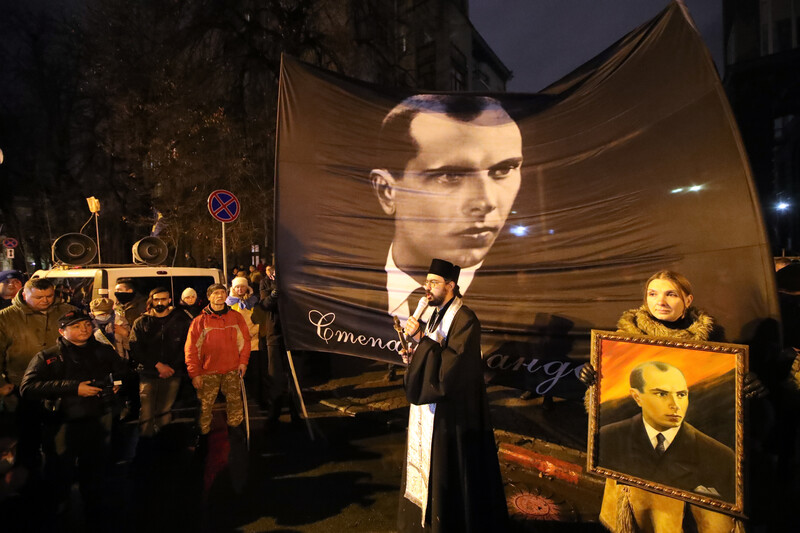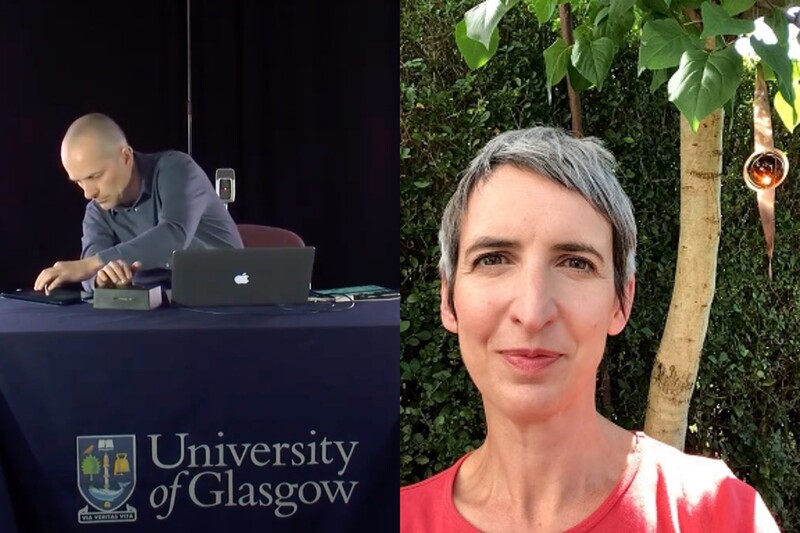
Mykola Tys / EPA-EFE
THE CONVERSATION
Published: March 22, 2022
News coverage of Ukraine’s war with Russia has been illustrated by images of men, young and old, taking up arms and fighting for their country. The political leaders involved are men who represent very different versions of masculinity.
Meanwhile, from an ad hoc TV studio outside Kyiv, Ukrainian news anchor Marichka Padalko drew attention to the nuances of gender roles during wartime. Interviewed by video link at Oslo’s House of Press, Padalko relayed a discussion she recently had with her husband about who should take care of their three children.
“I must defend the country,” her husband told her. Over a 20-year career as a reporter and anchor, Padalko has built solid audience trust. She felt she couldn’t abandon her people at a crucial time in history. “So do I,” she responded.
In the face of Russian disinformation campaigns, Padalko believes ensuring her fellow citizens get accurate accounts of the conflict is a task equally as important as fighting the Russian militarily. Eventually, her husband travelled with their three children to the western border of the country to bring them to safety.
“I do not have the luxury of seeing my children, but I know they are safe,” Padalko said before bravely declaring: “We will continue to broadcast until the very last minute.”
Gender and war
Besides the powerful testimony of being torn between motherhood and journalism in wartime, Padalko’s comments are a reminder of how gender-segregated wars often take shape.
“The connection between war and gender is arguably the most consistent gender issue across cultures,” renowned political scholar Joshua Goldstein wrote more than 20 years ago. He argued that this is a result of traits being equated with masculinity being constantly portrayed as aggressive and more appealing in situations of war.
In contrast, women are often portrayed as guided by pacifism and concern for others – typically feminine attributes. At a first glance, reports from the war in Ukraine seem to reinforce these gender stereotypes: the endless flow of women and children leaving their country, while men between the ages of 18 and 60 stay behind to fight. On closer inspection, much of the news coverage from the war in Ukraine shows the changing gender roles in war.
A recent New York Times podcast brilliantly addresses the insecurities and fears of Ukrainian men. Listeners are introduced to Eugene, who is ready to fight but cannot come to terms with the fact that the enemy, Russian soldiers, are his neighbours. Another young man desperately tries to cross the border to Poland, without success. He expresses his deep fear of holding a gun and carrying out violent actions and finds it terribly discriminatory that men are not allowed to leave: “I’m an illustrator. I’m trying to draw motivational posters. And just because, I’m sorry, I have a penis, I cannot leave.”
The Ukraine war coverage helps us see that there is not necessarily a difference between fleeing to save your children or fighting the enemy with weapons or words. All are actions of war.
Emotion in the media
In the newsroom, television reporters (not least male reporters) seem to show more emotion in the coverage of this war than what was traditionally seen in war reporting. This is perhaps a testament to the relatively recent emotional turn in journalism. The attention to emotion in journalism represents a shift that has opened up new spaces for more emotional and personalised forms of expression in public discussion.
Not to be outdone, the inspiring work by female reporters covering this conflict hasn’t gone unnoticed.
While not a journalist herself, Ukraine’s first lady, Olena Zelenska, has also joined the information battle to defend her country. As a screenwriter, she wrote for the comedy group that brought Volodymyr Zelensky into the limelight. Now, she uses her communication skills to dictate the pace of the ongoing information war.
Zelenska’s battlefield includes social media, where she shares images by professional photojournalists and adds poignant captions. In one post, Zelenska included pictures of women in military uniform in the trenches, women as part of a rescue crew with helmet and headlights and women caretakers of newborn babies in a provisional bomb shelter. She wrote: “Our new opposition has a female face to it.” Posts like this support new war narratives that don’t differentiate between fighting and caring as actions of war.
Gender both shapes and is shaped by media content. These personal stories contribute to the overall narrative of the war and feed into a larger story of power and information exchange. The more complex and human media portrayals of gender may also affect the world’s understanding and empathy of Ukrainians’ peril on the battlefield and as refugees, and eventually influence the mood for change in international security policies.
Professor of Journalism and Media Studies, Oslo Metropolitan University
Associate Professor in Media Studies, Utrecht University
Disclosure statement
Bruce Mutsvairo receives funding from Norwegian Research Council




